Fr. Joseph Farooq, the sole priest of the Russian Orthodox Church in Pakistan, has been working tirelessly to bring the light of Orthodoxy to the oppressed Christians of his native land since even before the establishment of the St. Michael the Archangel Mission in 2011. His path is not an easy one—poverty, discrimination against all Christians in a rigidly Moslem society, and isolation from other Orthodox countries are some of the challenges he faces continually in his endeavors to bring his people to the One Holy Catholic and Apostolic Church. But the humility and zeal of his flock inspires him to carry on with the great commission in Pakistan.
On Bright Friday, Fr. Joseph Farooq visited Sretensky Monastery in Moscow and concelebrated with the monastery clergy. We had the opportunity to share the Paschal joy with him, and hear more about his mission.
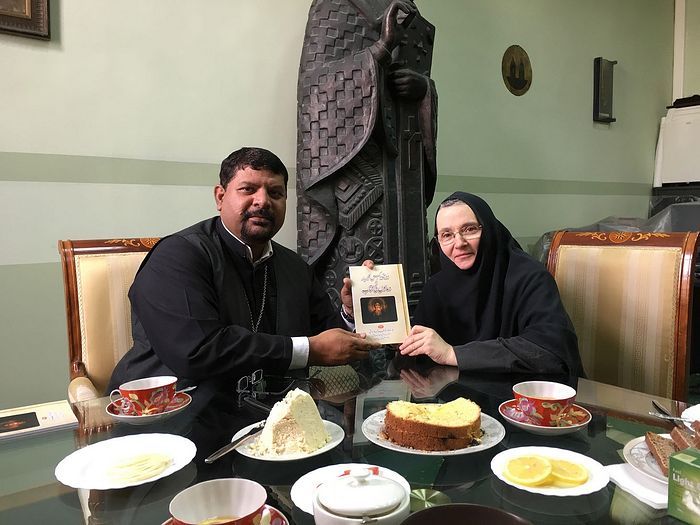 Pascha and kulich at Sretensky Monastery, with a copy of his translation of the Orthodox Prayer Book into the Urdu language.
Pascha and kulich at Sretensky Monastery, with a copy of his translation of the Orthodox Prayer Book into the Urdu language. —Fr. Joseph, tell us about how you became Orthodox.
—I was studying in the Roman Catholic seminary, in a theological program. In the Church History course I studied the Local Orthodox Churches, and read some books about the Orthodox Church. This roused my curiosity to learn more about holy Orthodoxy, so I studied it even more. When I became a Catholic priest I again studied the Orthodox Church, its history and traditions, and I found truth in it; the real spirit of the Church and its traditions attracted me. I began making contact with various Orthodox churches all over the world.
Thus, in 2011 I made contact with Metropolitan Hilarion [Kapral; then the Archbishop of Australia, now Metropolitan of Eastern America and New York, First Hierarch of the Russian Orthodox Church Outside of Russia], and he accepted our application. Then, with his blessing, I and my team started an Orthodox study center in Pakistan. We introduced the Orthodox Faith and traditions to the people of Pakistan. The people who come love these traditions.
We then appealed to Metropolitan Hilarion, and he sent the first Orthodox missionary to Pakistan from Australia—Fr. Adrian Augustus. He came and preached holy Orthodoxy in Pakistan. From the very beginning, he baptized and chrismated 175 people.
—That is quite a lot for the beginning!
—Yes, my team and I had taught them about holy Orthodoxy prior to his visit, and so they were prepared. This was but a small group of Orthodox people in Pakistan. Our work increased; everyday I visited people, taught them about Orthodoxy, and in 2013, I was ordained an Orthodox priest in Sri Lanka by His Eminence Metropolitan Hilarion, though the efforts of Fr. Adrian.
—Fr. Adrian is Indian, right?
—Yes, he is Indian.
So, after that we started an Orthodox parish with the blessing of Metropolitan Hilarion. The name of our parish is the St. Sergius of Radonezh Church of Sarghoda, Pakistan. Our mission is registered with the government of Pakistan as the St. Michael the Archangel Mission of Pakistan, through our Metropolitan’s prayers and God’s mercy.
Now our numbers are increasing day by day. We now have 365 Orthodox faithful in Pakistan. One thing I have been entrusted with is to work with the children. We have catechism classes every Sunday after Divine Liturgy for the children, and for the catechumens who want to become Orthodox.
We have also started adult education classes for the young Christian women, who were not able to attend regular schools due to financial constraints, and cultural and social pressure. The culture in Pakistan is very rigid, and people don’t send their daughters to school. The other reason is simply poverty. If there are any means, they will be used to send their boys to school, while the girls stay home to do housework.
Also, the education system in Pakistan is very specific to the country. There are two education systems there: one for the poorer classes, and another for the wealthy.
But poorer people cannot afford the fees, the cost of books, etc. Sometimes people come to me and say, “Father, we do not have money to buy books for school,” and I try to help them, but I am not the priest of a rich community.
So we have started an adult education center for these women, named after St. Matrona of Moscow.
—What made you choose St. Matrona as the patron saint of the school?
—We chose St. Matrona because she was blind, but God gave her the light, so that she could see everything. She never attended any school but she had the knowledge of God.
In this adult education center, we give these women a social education, and also teach them Orthodox prayers, Orthodox songs, and many other things. We have also arranged a health and hygiene program for them, just to make them more aware about their families’ health. They live in very poor conditions, and so they need some basic instructions on health—how to clean their houses, how to maintain their children in good health, how to give them the proper food. Our women also suffer from anemia, simply because they do not have enough to eat. This is a problem—vitamin and iron deficiency. Therefore, we provide them with medicines and vitamins, as it is especially difficult for the pregnant women.
—How often do you celebrate the Liturgy?
—We celebrate the Liturgy every Sunday and on feast days.
—Are you able to have Vigil services on Saturday night?
—It is very difficult for people to attend because they come from far away. But we have Matins and the Gospel reading, and so those who live near the parish house can come.
On Sundays we have the Sacrament of confession, so people can confess and partake of Holy Communion.
—You yourself grew up Catholic. Did you also go to a Catholic grade school?
—Yes, I went to a Catholic boarding school. Then I joined the Catholic seminary. I first became a Catholic priest, and after being received into Orthodoxy, I became an Orthodox priest.
—As we know, the government in Pakistan is biased against Christians and favors Islam. There have even been many cases of persecution against Christians. What is your own experience with your Muslim neighbors? How do the local people relate to you as a Christian?
—The people are very friendly with me. I have also participated in the peace conferences held in Pakistan. I represent the Orthodox Church and my bishop. Orthodoxy teaches love and peace, as our holy fathers St. Seraphim of Sarov and St. Sergius of Radonezh and our holy mother St. Matrona taught. All the monastic saints of our Church preached love and peace; they were living examples of the holy Gospel, and they were a light to the people. So I present the true spirit of holy Orthodoxy, by preaching peace, harmony, and human unity in Pakistan.
—So the ordinary Moslems around you are well disposed toward you. But what about the extremists?
—Yes, there are extremists, but it is a very small group. The majority of Muslims are good, but these extremists are a very minor group. There is the organized Taliban group, and there are other extremist groups with links to the Taliban. I will share with you the historical point of view. There have been twenty-three years of war with Kandahar, Afganistan, about which the Russians know well, and during this war jihadi groups were formed who fought in Afganistan against the Soviet troops. So, after the end of the Soviet war, these jihadi groups were not punished. And now there are many, many such groups who are operating today in Pakistan.
—So these included Pakistani fighters?
—Yes, there were very many Pakistanis involved, working with the Taliban.
—But they are in hiding?
—Yes, but they come and organize suicide attacks in Pakistan. They are all organized by the Taliban. They attack the government, the Christians, and even the mosques. There have been suicide bombers everywhere. Everyone suffers—the Moslems as well as the Christians.
—Yes, after all, if a bomb goes off in a public place, it destroys indiscriminately.
—Yes, indeed.
—Has anyone in your community experienced any trouble from these groups?
—No, not so far.
—They are under the protection of the Archangel Michael.
—Yes, I believe so.
—You have mentioned that there are now people in your community who are even interested in monasticism.
—Yes, there is one candidate. His name is Andrew Yusef. He spent eleven years in the Roman Catholic seminary. He is not married, and has a strong desire and wish to become an Orthodox monk. He shared with me, that he was once reading the Life of St. Seraphim of Sarov, and as he read this Life, he felt that St. Seraphim was talking to him. He was very impressed with the Lives of St. Sergius and St. Seraphim of Sarov, and Fr. Thaddeus of Serbia, about whom the book, Our Thoughts Determine Our Lives was written.
Another candidate is Aron Din, who has a Masters degree in human resources. He wants to become a priest. He is married, and his wife works as a nurse in a hospital.
These two young men serve with me in the altar and as readers, with the blessing of Metropolitan Hilarion. They are also part of my pastoral team.
In fact, I have a very good pastoral team; it includes my wife—my matushka—Sophia, and there is also Nicholas Azad, Monica Shazim, Ruth Aron, Ruth Samwel, my son Dimitrius, and my daughter Mary. There are also elderly people participating—Alexander, Peter, and two elderly women as well. These elderly women are very, very active. One’s name is Sofrina—her Pakistani name is Shenaz—and the other Sedara Bibi, whose baptismal name is Catherine. They are also a very active part of our pastoral team. So, I have a very good team.
Our people are so humble, so patient. We have no church, no parish. We celebrate the Divine Liturgy under tents on the feasts days—Christmas, the Bright Pascha, Saints Seraphim of Sarov, Sergius of Radonezh, and Matrona of Moscow, St. Nicholas, St Michael the Archangel and all the Bodiless Host. People are so patient, and because of our very small resources, I am not able to give them any material help. But they are so humble, so faithful. We are constantly praying that God would provide us kind donors. We have made pleas to many people for help, that with God’s help and the blessing of Metropolitan Hilarion we could construct the first Russian Orthodox church in Pakistan.
—Right now there is also a Greek Orthodox church, right?
—Yes, they have constructed the first Greek Orthodox church in their community. They purchased the land and constructed a church.
—Are you in contact with this community?
—I am in contact with the priest, Fr. John Tanveer.
—It is good that you have at least that support in your own country. How do you go about teaching and enlightening your people?
—I preach, and I have also translated into Urdu the catechism of the Eastern Orthodox Church written by St. Nicholai (Velimirovich) of Serbia, who is also called the new Chrysostom.. I have also translated the Divine Liturgy of St. John Chrysostom, and have made a plea for donations to print these books.
—Are most of the people who come to you already Christian of some denomination?
—Yes. As I know, there is salvation in the Orthodox Church. I am working mostly with people who are Protestants. There are so many different confessions in Pakistan, and I try to guide them to the true Church, the Orthodox Church.
Here is an interesting thing: When I perform funerals for the Orthodox, other Christians come and see this tradition, and they are attracted by it. They say, “Father, we also want to learn about holy Orthodoxy.” When I celebrate the Divine Liturgy in the tent at funeral services for the reposed, their relatives come, who might be Catholic, or Protestant. When they see our traditions and prayer, they become very interested.
So many people contact me from all over Pakistan. Every day I receive letters, emails, telephone calls; people watch us on Facebook and other social media. And they are so happy, so excited that the Orthodox Church exists in Pakistan. So, they invite us to come to their places and teach them about holy Orthodoxy. I have to answer that I first of all have to concentrate on our Sarghoda parish and don’t have the resources to go elsewhere, but I ask them to please pray that I could. But I have happily visited Lahore, Multan, and other cities close to Sarghoda to preach Orthodoxy, and we have established groups there. But the problem is the resources. We need more resources to make more parishes in Pakistan.
—And to educate priests for these communities…
—Yes, to educate priests also. As for me, I also need some training, I need more experience with liturgical life in Russia, as I could see here today at the Liturgy in Sretensky.
—Have you looked into distance training?
—Yes, the two candidates I mentioned earlier are taking the online courses offered by Fr. Gregory Joyce in the Chicago Diocese [of ROCOR]. They will complete it in September. So they are already learning, as part of the program.
—Do you have any women who are interested in monasticism?
—Yes, we do, but we are having difficulties finding them a place to go. There are three young Christian girls, one of them with a university degree, and they want to join a convent and become nuns. However, no matter how many letters I have written I have not received any response.
You see, I am the only priest of the Russian Church serving in Pakistan. There is only one.
—Do you see a future for Orthodoxy in Pakistan?
—Yes, I see a great future for Orthodoxy in Pakistan, because we began with a very small group of 170 people, and now we have 365. I have a very bright vision for this Orthodox group. That is why I am here [in Russia]—I need to find a way for these two men who want to be priests to receive a theological education, and for many more priests in Pakistan. I would also like to see these priests from Pakistan working in other countries as missionary priests.
It is a good sign that Orthodoxy is growing day by day in Pakistan. People love this Church; they love the traditions.
—Do you feel that the Pakistani soul resonates with Orthodoxy?
—Yes, definitely. Orthodoxy is part of the East, and we are also part of the East. Eastern people love traditions. I see the love and strong desire for holy Orthodoxy in their eyes.
I conducted a seminar for my people on the topic of Holy Orthodoxy and Eastern people. I told them that Orthodoxy was first preached and established in the East. Then it went to the West.
—And did they respond to that?
—Yes, they responded to it.
—Fr. Joseph, tell us about your impressions of Russia.
—I saw people in the churches here; I visited the Theophany Cathedral [in Moscow], the St. Sergius Lavra, and Sretensky Monastery. I saw the true worship of Orthodoxy. People are so spiritual in their worship. They are involved in their worship. They never look here and there. They’re really involved. They are praying the prayer of the Publican: “Lord have mercy on me…” With the blessing of Metropolitan Hilarion, I am here to experience the liturgical life, to see the traditions; how the priest moves around the altar; how the priest censes the people, the holy table; what they do with the prosphora. I am experiencing all of this. This has all been very good for me.
The day before yesterday, I observed the liturgical practice at the Theophany Cathedral, and today also here at Sretensky.
—Do you feel that there could potentially be a good relationship between your people and the Russians?
—Yes! Especially since these days. Russia and Pakistan are good friends. There are Russian military exercises and cooperation in Pakistan; there are many Pakistanis doing business in Russia, and likewise many Russians doing business in Pakistan. So there is a good mutual understanding and good relations between the two countries.
I also represent the Russian Church in Pakistan; I represent His Holiness Patriarch Kirill of Moscow and All Russia, because I am in the Russian Church Outside of Russia, which is in spiritual and canonical unity with the Moscow Patriarchate.
Have you seen the photos of our celebrations? I display the Russia flag, as a sign of harmony and unity between our two countries.
—Has anyone ever come from Russia to visit you?
—No, not yet, but I hope for that. There are so many priests in Russia, and I wish that one of them would come as a missionary to Pakistan.
—Would there be any trouble for them there? You mentioned before that Americans are generally not welcome there, and white people draw negative attention.
—No, there would not be any trouble at all for the Russians. The trouble is only with Americans. Because of the U.S.’s war in Afghanistan, people in Pakistan do not like Americans. But they are very friendly and cooperative with the Russians.
So, this is the best time for a mission by the Russian Church. Just as the Americans and British once preached [Protestant] Christianity in Pakistan, now is the time for the Russians to preach holy Orthodoxy in Pakistan. This is the best time. And I pray to St. Sergius and St. Matrona to send missionaries to Pakistan! You will see, that Orthodoxy will become the second largest Christian religion after Catholicism.
—Is there anything that you would like to say to our readers in conclusion?
—First of all I would like to say that I am thankful to God that He has given me the chance to visit the Russian land. It is really a blessing for me to visit the holy places, holy monasteries, and venerate the relics of the saints. Just yesterday I venerated the relics of our patron, St. Sergius of Rodenezh, at the Holy Trinity-St. Sergius Lavra. When I went to kiss the relics of St. Sergius, I went barefoot, in order to demonstrate my love and veneration. His relics are of course the most holy place in the monastery.
—So you left your shoes outside the church, like Moses at the burning bush!
—Yes! I prayed very much to St. Sergius, because I know that he is truly a powerful saint before God. In fact, I pray every day to St. Sergius, that he would protect us and save us. Every day I pray to St. Sergius, St. Matrona of Moscow, and St. Michael the Archangel. I pray, “Oh blessed father, St. Sergius, save us through your holy prayers!” I also ask St. Matrona and St. Michael for their protection, and the success of the mission. Please let your Russian readers know, that I am praying to these saints that they would send Russian missionaries to Pakistan!
—Thank you Fr. Joseph, for talking with us. It has been a blessing to have you here.
—I thank you also for caring about the mission in Pakistan. May God send His help and blessings to your missionary team, your co-workers on this website! Christ is Risen!

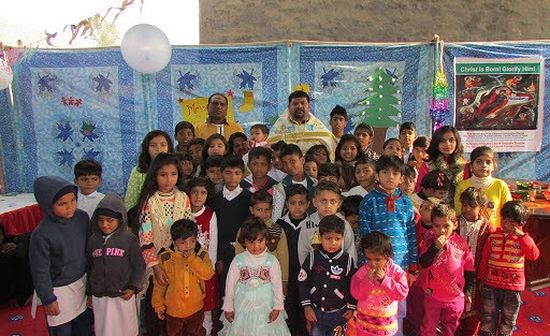
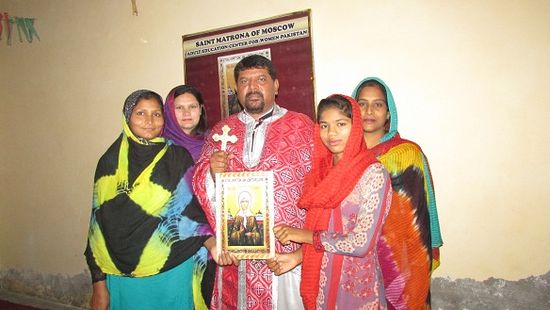
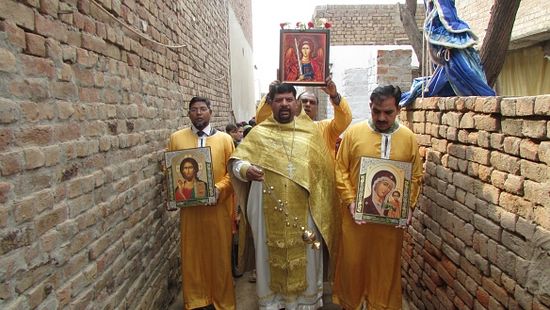
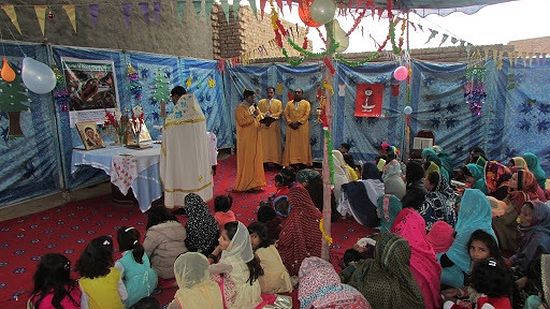
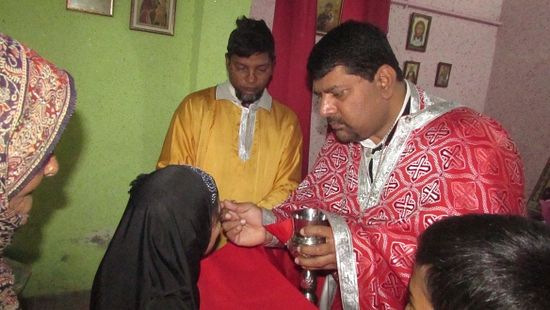

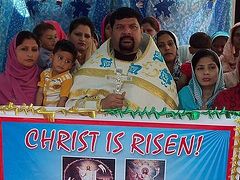
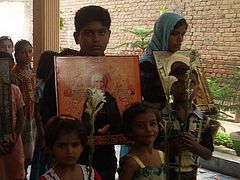
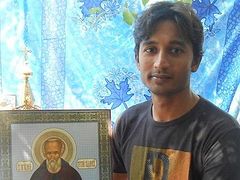

I saw this article was written two years ago. I hope my message finds you well!
As an Romanian Orthodox myself, I am impressed to learn about the growing of an Orthodox Christian community in Pakistan. God bless you!
My question is: would it be possible, one day, that all the Orthodox parishes (by Greek and Russian origins) would be united in one single Pakistani Orthodox Church, as a national church, affiliated to the Ecumenical Patriarchate?
I know that Russian Orthodox Church is, by now, not in good terms with the Ecumenical Patriarchate from Constantinople. But the creating of a national Pakistani Orthodox Church should be the aim, in the end, of the missionary work.
I am a convert and member of ROCOR. I post this to remind that although our language differs, our faith does not.
With love in Christ to all.
Christ is Risen!
I am pleased to share my views about the interview of my parish priest Fr.Joseph Farooq. I am Aaron Nadeem Russian Orthodox believer in Pakistan and with the blessing of His Eminence Metropolitan Hilarion. I am the student of Pastor School of Theology, Chicago,USA. Here i would like to thanks our parish priest Fr.Joseph Farooq for his hard labour for preaching Holy Orthodoxy in Pakistan under the kind protection of His Eminence Metropolitan Hilarian. We are proud of our Russian orthodox faith. May God strengthen us to follow the sacred traditions of the mother church.
Aaron Nadeem
Parishioner of St.Sergius Radonezh Russian Orthodox Church,Sargodha, Pakistan.
Christ is Risen!
Here I would like to explain the point of learning other languages and we cannot make comparison between Pakistan and America or any other western nation. where as most of the orthodox faithful in Pakistan are illiterate and a few who are little literate are even unable to read and write their own national language properly. Glory to God that that holy orthodoxy and sacred traditions are becoming integral part of their faith. I humbly request you to pray for our survival and protection.
I humbly request you please believe in the work I am doing in Pakistan. Both me and my parishioners are liable to face punishment or even death being followers of Jesus Christ! I being a weak and unworthy servant of the Lord preaching the holy orthodoxy in the most difficult region of the world,where Christianity has been facing persecution and suffering because of controversial Islamic laws.
May the Heavenly Father showers upon you His Divine mercy and graces each day.
In Christ Jesus,
Fr.Joseph Farooq
As for the linguistic question. It seems obvious to me that since there are no Russians attending Fr. Joseph's church in Saraghoda, Pakistan, the language used in church would be Urdu. However, I am aware that in Florida the Russians greatly outnumber the American converts, and it is understandable that they would choose Church Slavonic. But I also know that there are a number of ROCOR parishes consisting of mostly converts, and there services are in English.
@Nicholas - Greetings of the day! Rejoice my beloved! And many, many thanks for taking the time out to express your gripes about 'schismatic' ROCOR local not using the local lingo in your neck of the woods. Perhaps ROCOR local thought they were being pragmatic when using Urdu since it is more likely to attract followers in places like Pakistan where things are slightly (only slightly it would seem) less developed than they are in Amerika. Perhaps ROCOR local felt that in Amerika, people would be slightly less inclined to show nationalist, linguistic chauvinism than they would otherwise be in places like Pakistan. I think however, if we're honest with ourselves, Church Slavonic and Hellenic languages are far superior to English than the western man would ever admit, especially given their superiority complex in all aspects of life, including as it would seem that of the Church. You can't understand the services. Well I'm an Hellene who attends the Russian Church and neither can I. So what. Just pray. And I say once again rejoice!
I'm glad they recognize the Lord's love of all peoples everywhere else.